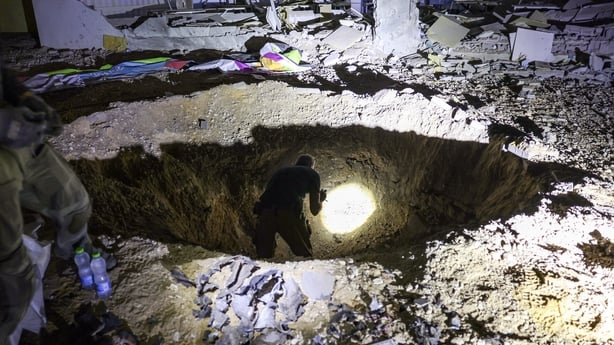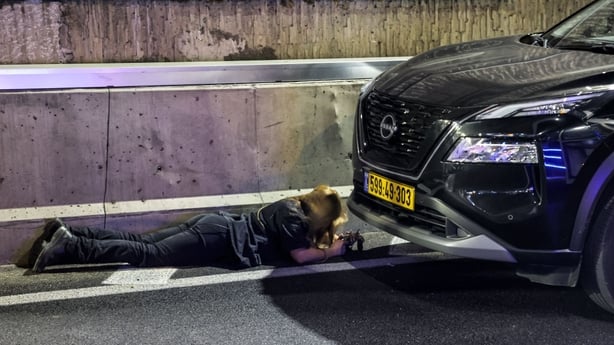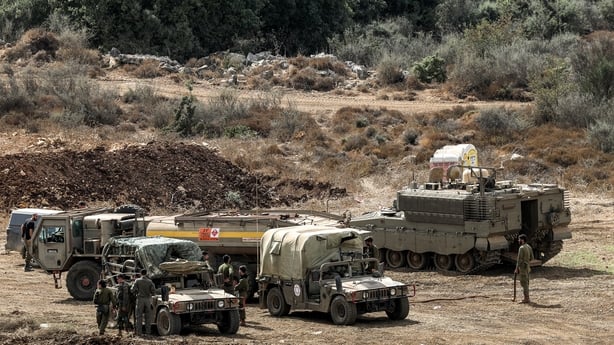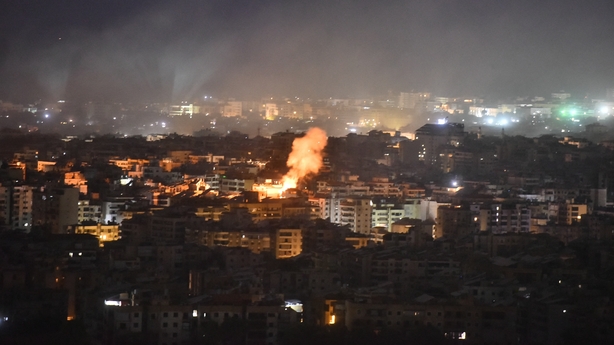Israeli Prime Minister Benjamin Netanyahu promised that arch foe Iran would pay for its missile attack against Israel, while Iran said any retaliation would be met with "vast destruction", raising fears of a wider war.
Mr Netanyahu called Iran's massive missile attack on Israel "a big mistake" and vowed to make Tehran "pay for it".
"Iran made a big mistake tonight and will pay for it," said Mr Netanyahu hours after the attack, and warned: "Whoever attacks us, we attack them."
In a separate statement, Defence Minister Yoav Gallant, who was at the command and control centre monitoring the interception of Iranian missiles, also vowed to punish Iran for the attack.
"Iran has not learned a simple lesson - those who attack the state of Israel, pay a heavy price," he said in a statement issued by his office.
It comes after Iran fired a salvo of ballistic missiles at Israel in retaliation for Israel's campaign against Iran's Hezbollah allies in Lebanon.
Alarms sounded across Israel and explosions could be heard in Jerusalem and the Jordan River valley after Israelis piled into bomb shelters.

Reporters on state television lay flat on the ground during live broadcasts.
Reuters journalists saw missiles intercepted in the airspace of neighbouring Jordan.
Israel said more than 180 missiles were launched into Israel from Iran and Israeli air defences were activated to intercept them.
US Navy warships fired about a dozen interceptors against Iranian missiles headed toward Israel, the Pentagon said.
Iran's Revolutionary Guard Corps said the assault was in retaliation for recent Israeli killings of militant leaders and aggression in Lebanon and Gaza.
Its forces used hypersonic Fattah missiles for the first time, and 90% of its missiles successfully hit their targets in Israel, the Revolutionary Guards said.

No injuries were reported in Israel, but one man was killed in the occupied West Bank, authorities there said.
US President Joe Biden said that the United States was "fully supportive" of Israel after Iran's ballistic missile attacks, describing Iran's assault as "defeated and ineffective."
Mr Biden said he would now discuss with Israeli Prime Minister Benjamin Netanyahu about how to respond to Iran, but that it remained to be seen what shape that response would take.
"The attack appears to have been defeated and ineffective, and this is a testament to Israeli military capability and the US military," Mr Biden told reporters at the White House.
"Make no mistake, the United States is fully, fully, fully supportive of Israel."
Earlier, the Israeli military had announced that any ballistic missile strike from Iran was expected to be widespread and told the public to shelter in safe rooms in the event of an attack.
Iran had vowed to retaliate following attacks that killed the top leadership of its Hezbollah allies in Lebanon.
The firing of missiles came after Israeli troops launched ground raids into Lebanon, in the biggest escalation of regional warfare since fighting erupted in Gaza a year ago.
Israel's elite units launched limited ground raids into Lebanon in the last day, as Hezbollah fired missiles at Tel Aviv.
The tit-for-tat escalation following weeks of intense Israeli airstrikes on Lebanon raised concerns of a broader Middle East conflagration bringing in both Iran and the US.

Fifty-five killed in Israeli strikes on Lebanon
On the same day as Iran's missile attack on Israel, the Lebanese health ministry announced that 55 people had been killed in Israeli strikes across Lebanon.
An additional 156 people were wounded in attacks throughout the day, the ministry said.
Later this evening, Israel called on residents of Beirut's southern suburbs to evacuate ahead of a possible fresh round of strikes.
Israel carried out one attack that hit a high-rise building in Beirut city's Jnah area and one on the capital's southern suburbs that briefly closed the road to Beirut airport, two Lebanese security sources said.
The Israeli military said it had carried out a "precise strike".
An Israeli security official earlier said troops in southern Lebanon had begun limited raids into Lebanon overnight that only went a short distance over the border, adding that no direct clashes with Hezbollah fighters were reported.
Live updates: Israel says missiles launched from Iran into Israel
Israeli forces have been carrying out raids into southern Lebanon for months, uncovering Hezbollah tunnels and weapons caches under homes and invasion plans by the group, Israeli military spokesman Daniel Hagari said.
The operations had uncovered plans by Hezbollah to enter Israel and carry out an attack similar to the one led by the Palestinian militant group Hamas in southern Israel on 7 October last year that triggered the current conflicts.
Hezbollah has not commented on his claims.
Escalation in Lebanon continues
Iran had vowed to retaliate following Israeli strikes that killed the top leadership of its ally Hezbollah in Lebanon, including the group's leader Hassan Nasrallah, a towering figure in Iran's network of fighters across the region.
Hamas, the Iran-backed militant group in Gaza, praised the Iranian missile strikes, saying they avenged Israeli assassinations of three militant leaders, including Mr Nasrallah.
Palestinians in the Gaza Strip, locked in nearly a year of war, celebrated as they watched dozens of rockets en route to Israel.
Some of those rockets fell in the Palestinian enclave after being intercepted by Israel but caused no deaths, witnesses said.
In Beirut, Israeli strikes killed the commander of the Imam Hussein division, Israel's military said, referring to a Hezbollah-linked group based in Syria.

Israel said overnight that its troops had launched ground raids into Lebanon, though it described the forays as limited.
Nearly 1,900 people have been killed and more than 9,000 wounded in Lebanon in nearly a year of cross-border fighting, most in the past two weeks, according to Lebanese government statistics on Tuesday.
But a ground campaign into Lebanon for the first time in 18 years pitting Israeli soldiers against Hezbollah, Iran's best-armed proxy force in the Middle East, would be a major regional escalation.
Israeli army video shows strikes on what is said to be Hezbollah missile launchers, near Beirut's airport

